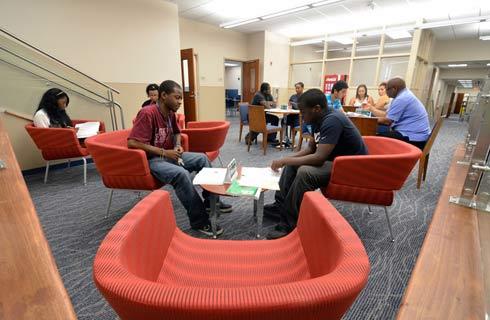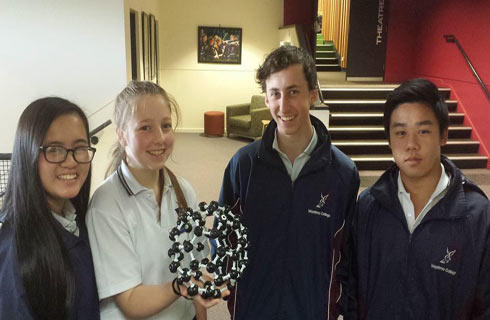英语文学硕士-应用语言学
Master of Arts in English - Applied Linguistics

学历文凭
Masters Degree

专业院系
Department of English

开学时间

课程时长

课程学费

国际学生入学条件
Prospective students must submit the following:
An application fee that must be paid electronically when the application is submitted.
An unofficial transcript, with GPA, from each post-secondary school, attended, if a student is admitted, an official transcript will be required.
A statement of purpose outlining the student's preparation and goals for pursuing graduate education in English.
Your statement of purpose is an academic autobiography, rather than a story about who you are as an individual, about 600-1000 words in length. What sparked your interest in English studies? How does your academic and/or professional background prepare you for graduate study in English? Which concentration(s) most interest(s) you, and what do you hope to study in an M.A. program at UNC Charlotte's English Department? How does an M.A. in English ready you for your intended goals after graduation?
An academic autobiography will necessarily be personal as well, but we are primarily looking for intellectual engagement with your intended area of research or creative activity. We want to know that you are enthusiastic about successfully completing challenging coursework, research, and writing. We understand that you may have experienced setbacks along the way: if so, this is the place to address them, briefly. Given that this is our only opportunity to see your writing, please write carefully, revise, and polish your statement.
Three academic recommendations from individuals who can attest to the student's academic qualifications (ideally, college professors, not employers or personal references). If a student has been out of school for a long period of time, references may be professional. These recommendations are requested of the recommenders electronically as part of the application process.
A writing sample of 6-10 pages, which must be an example of analytical, scholarly writing (rather than creative writing) in any area of English studies. You may send an excerpt from a longer work with a short prefatory paragraph offering a description or introduction to the selection. If you have been out of school for an extended period and do not have a scholarly writing sample, please contact Professor Vetter, Director of Graduate Studies, at
International applicants (i.e., those whose native language is not English or whose previous degrees are not at an American university) must also demonstrate proficiency in English by having scores sent to the Graduate School from the Test of English as a Foreign Language (TOEFL) or the International English Language Testing System (IELTS). Scores older than two years will not be accepted. During the pandemic, scores on the Duolingo English Test may be used instead of the TOEFL or IELTS.
For non-native English language speakers: official and satisfactory scores on the English language proficiency scores on the Test of English as a Foreign Language (TOEFL) or the International English Language Testing System (IELTS) are required. A minimum score of 83 on the Internet-based TOEFL or a minimum overall band score of 6.5 on the IELTS is required for admissions consideration.
IDP—雅思考试联合主办方

雅思考试总分
6.5
了解更多
雅思考试指南
- 雅思总分:6.5
- 托福网考总分:83
- 托福笔试总分:557
- 其他语言考试:DuoLingo English Test, the minimum proficiency score required is 115
CRICOS代码:
申请截止日期: 请与IDP顾问联系以获取详细信息。
课程简介
Applied linguistics will concern itself with the real-life particulars of language, in practical matters such as how decisions are made based on language, how people self-identify or deal with one another through language, and how language works in specific contexts. Applied linguists are typically interdisciplinary, working in fields such as computational linguistics (extracting patterns from large language corpora, making computers interact with people), forensic linguistics (analyzing legal language, identifying voice prints, determining if someone was speaking truthfully, etc.), language acquisition and socialization (researching second language learning and cultural development), language teaching (second language, teaching reading and writing), language and identity (analyzing the role of language in shaping the identities of individuals and groups), language therapy (e.g. after a stroke), language across the lifespan (the effects of aging on language), sociolinguistics (language change and variation in relation to sociocultural context), and pragmatics (language use in specific situations and for specific purposes and the cognitive processes that make use of social and cultural information)<br>There are many subdisciplines within applied linguistics, and new discoveries in science will create yet more. Advances in brain research gave rise to the field of neurolinguistics in the seventies, current strides in genetics and paleoanthropology are now necessitating the new field of paleolinguistics the study of whether certain hominins could talk and how their language would have gone beyond animal communication.<br><br>Students completing the M.A. concentration in Applied Linguistics will be prepared for Ph.D. studies in linguistics as well as careers in fields as diverse as intelligence, forensic document analysis, publishing/journalism, language and information technology, speech therapy, technical copy editing, lexicography, and library science.
相关申请
 预科
预科 奖学金
奖学金 实习机会
实习机会 在校学习
在校学习 跨境学习
跨境学习 校园授课-线上开始
校园授课-线上开始 在线/远程学习
在线/远程学习
关于北卡罗来纳大学夏洛特分校

北卡罗来纳大学夏洛特分校 (University of North Carolina at Charlotte,简称:UNC Charlotte 或UNCC),是北卡罗来纳大学教育系统下一综合研究型性大学,位于北卡罗来纳州的金融中心夏洛特,是夏洛特市最著名的学府,科研教学和师资力量雄厚。夏洛特市是一个文化集锦的地方,又是全美第二大金融中心和美国最重要的商业领域。 北卡罗来纳大学系统和加州大学系统,目前被誉为是全美最优秀的大学系统。北卡罗来纳大学夏洛特分校成立于1946年,它是北卡罗来纳大学系统的16所分校中的第4大分校(位于UNC Chapel Hill, NCSU, UNC Greensboro之后)。该校共设有9个学院,可提供18个博士专业、62个硕士专业和90个本科专业,所有专业均通过国家级鉴定。在校学生超过25000人。UNCC设有语言培训中心(ELTI),该中心1978年成立,为准备进入美国大学就读的国际学生快速习惯美国文化、掌握语言技能和学术研究技巧提供周到的辅导培训课程。UNCC可为符合条件的国际学生颁发有条件录取通知。 学校环境优美,科研和教学设备先进,设施齐全,科研教学和师资力量雄厚,是一所有着浓厚文化气息和良好学习氛围的现代化综合性大学。该校图书馆藏书130万册,为夏洛特市最大的图书馆,为学生查阅资料提供了便利条件。 2008年末美国总统大选前夕,奥巴马曾在该校作最后的竞选宣传。
本校相关课程
其他相关课程

英文哲学博士
 滑铁卢大学
滑铁卢大学学历文凭
Ph.D.
开学日期
课程费用总额


英语文学硕士-文学研究(课程工作)
 滑铁卢大学
滑铁卢大学学历文凭
Masters Degree
开学日期
课程费用总额


英语文学士
 圣弗朗西斯泽维尔大学
圣弗朗西斯泽维尔大学学历文凭
Bachelor Degree
开学日期
课程费用总额


英语文学士-修辞学(3年)
 劳伦森大学
劳伦森大学学历文凭
Bachelor Degree
开学日期
课程费用总额


英文哲学博士
 达尔豪斯大学
达尔豪斯大学学历文凭
Ph.D.
开学日期
课程费用总额


英语文学硕士
 达尔豪斯大学
达尔豪斯大学学历文凭
Masters Degree
开学日期
课程费用总额





















 美国
美国










